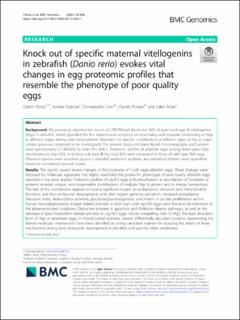| dc.contributor.author | Yilmaz, Ozlem | |
| dc.contributor.author | Patinote, Amelie | |
| dc.contributor.author | Com, Emmanuelle | |
| dc.contributor.author | Pineau, Charles | |
| dc.contributor.author | Bobe, Julien | |
| dc.date.accessioned | 2022-03-07T10:31:43Z | |
| dc.date.available | 2022-03-07T10:31:43Z | |
| dc.date.created | 2022-02-23T11:02:29Z | |
| dc.date.issued | 2021 | |
| dc.identifier.citation | BMC Genomics. 2021, 22 (1), . | en_US |
| dc.identifier.issn | 1471-2164 | |
| dc.identifier.uri | https://hdl.handle.net/11250/2983365 | |
| dc.description.abstract | We previously reported the results of CRISPR/Cas9 knock-out (KO) of type-I and type-III vitellogenins (Vtgs) in zebrafish, which provided the first experimental evidence on essentiality and disparate functioning of Vtgs at different stages during early development. However, the specific contributions of different types of Vtg to major cellular processes remained to be investigated. The present study employed liquid chromatography and tandem mass spectrometry (LC-MS/MS) to meet this deficit. Proteomic profiles of zebrafish eggs lacking three type-I Vtgs simultaneously (vtg1-KO), or lacking only type III Vtg (vtg3-KO) were compared to those of wild type (Wt) eggs. Obtained spectra were searched against a zebrafish proteome database and identified proteins were quantified based on normalized spectral counts. | en_US |
| dc.language.iso | eng | en_US |
| dc.title | Knock out of specific maternal vitellogenins in zebrafish (Danio rerio) evokes vital changes in egg proteomic profiles that resemble the phenotype of poor quality eggs | en_US |
| dc.type | Peer reviewed | en_US |
| dc.type | Journal article | en_US |
| dc.description.version | publishedVersion | en_US |
| dc.source.pagenumber | 0 | en_US |
| dc.source.volume | 22 | en_US |
| dc.source.journal | BMC Genomics | en_US |
| dc.source.issue | 1 | en_US |
| dc.identifier.doi | 10.1186/s12864-021-07606-1 | |
| dc.identifier.cristin | 2004779 | |
| dc.relation.project | EC/FP7/626272 | en_US |
| cristin.ispublished | true | |
| cristin.fulltext | original | |
| cristin.qualitycode | 1 | |
